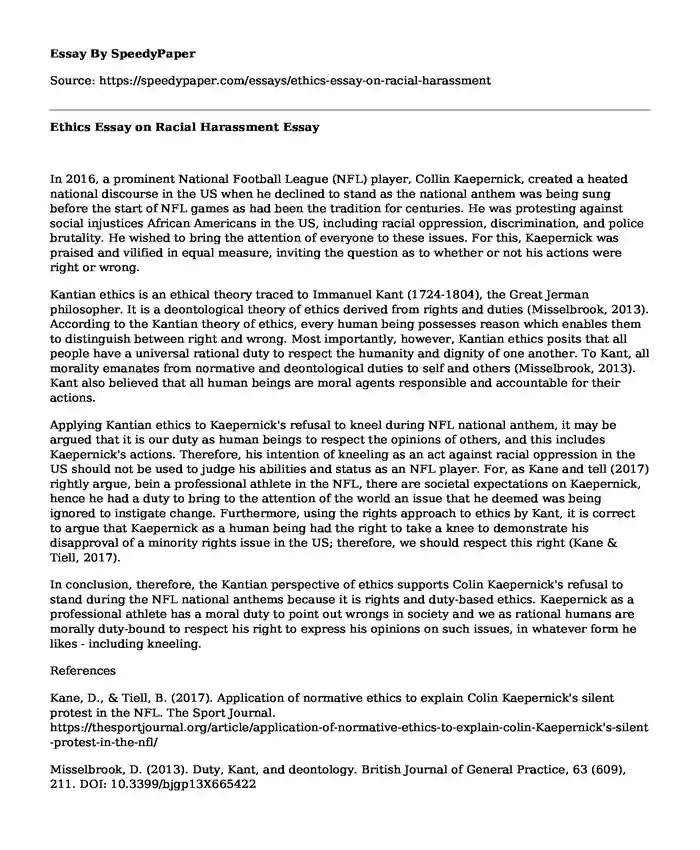
| Type of paper: | Case study |
| Categories: | Racism |
| Pages: | 2 |
| Wordcount: | 464 words |
In 2016, a prominent National Football League (NFL) player, Collin Kaepernick, created a heated national discourse in the US when he declined to stand as the national anthem was being sung before the start of NFL games as had been the tradition for centuries. He was protesting against social injustices African Americans in the US, including racial oppression, discrimination, and police brutality. He wished to bring the attention of everyone to these issues. For this, Kaepernick was praised and vilified in equal measure, inviting the question as to whether or not his actions were right or wrong.
Kantian ethics is an ethical theory traced to Immanuel Kant (1724-1804), the Great Jerman philosopher. It is a deontological theory of ethics derived from rights and duties (Misselbrook, 2013). According to the Kantian theory of ethics, every human being possesses reason which enables them to distinguish between right and wrong. Most importantly, however, Kantian ethics posits that all people have a universal rational duty to respect the humanity and dignity of one another. To Kant, all morality emanates from normative and deontological duties to self and others (Misselbrook, 2013). Kant also believed that all human beings are moral agents responsible and accountable for their actions.
Applying Kantian ethics to Kaepernick's refusal to kneel during NFL national anthem, it may be argued that it is our duty as human beings to respect the opinions of others, and this includes Kaepernick's actions. Therefore, his intention of kneeling as an act against racial oppression in the US should not be used to judge his abilities and status as an NFL player. For, as Kane and tell (2017) rightly argue, bein a professional athlete in the NFL, there are societal expectations on Kaepernick, hence he had a duty to bring to the attention of the world an issue that he deemed was being ignored to instigate change. Furthermore, using the rights approach to ethics by Kant, it is correct to argue that Kaepernick as a human being had the right to take a knee to demonstrate his disapproval of a minority rights issue in the US; therefore, we should respect this right (Kane & Tiell, 2017).
In conclusion, therefore, the Kantian perspective of ethics supports Colin Kaepernick's refusal to stand during the NFL national anthems because it is rights and duty-based ethics. Kaepernick as a professional athlete has a moral duty to point out wrongs in society and we as rational humans are morally duty-bound to respect his right to express his opinions on such issues, in whatever form he likes - including kneeling.
References
Kane, D., & Tiell, B. (2017). Application of normative ethics to explain Colin Kaepernick's silent protest in the NFL. The Sport Journal. https://thesportjournal.org/article/application-of-normative-ethics-to-explain-colin-Kaepernick's-silent-protest-in-the-nfl/
Misselbrook, D. (2013). Duty, Kant, and deontology. British Journal of General Practice, 63 (609), 211. DOI: 10.3399/bjgp13X665422
Cite this page
Ethics Essay on Racial Harassment. (2023, May 14). Retrieved from https://speedypaper.com/essays/ethics-essay-on-racial-harassment
Request Removal
If you are the original author of this essay and no longer wish to have it published on the SpeedyPaper website, please click below to request its removal:
- Essay Sample: Racism, Slavery, Bourgeois and Proletarians in Frederick Douglass's Life
- The Prescription Opioid Epidemic: Article Analysis Essay
- Essay Sample on Political Meaning - The Mule
- Essay Example: Illegal Drug Abuse
- Essay Sample: Interview Report
- This Is America: A Critical Look at Racial Inequality - Essay Sample
- Unveiling Racism: A Comprehensive Exploration in 'How to Be an Antiracist' - A Free Essay Example
Popular categories




